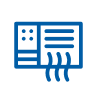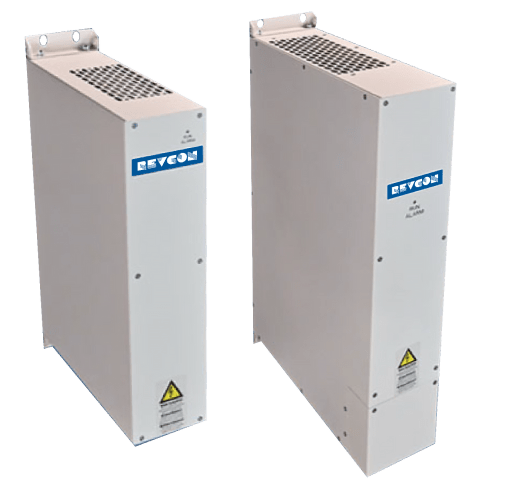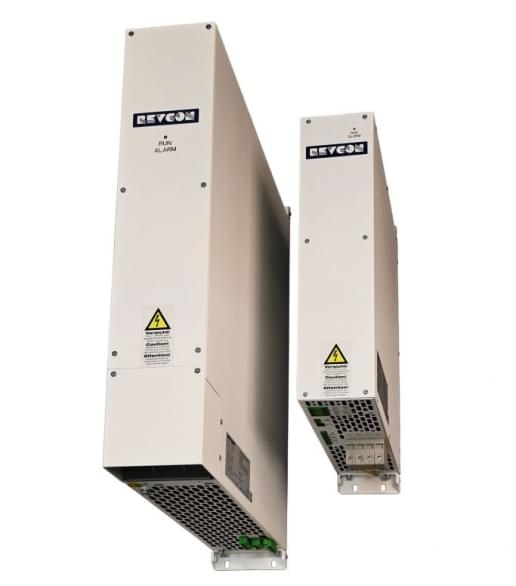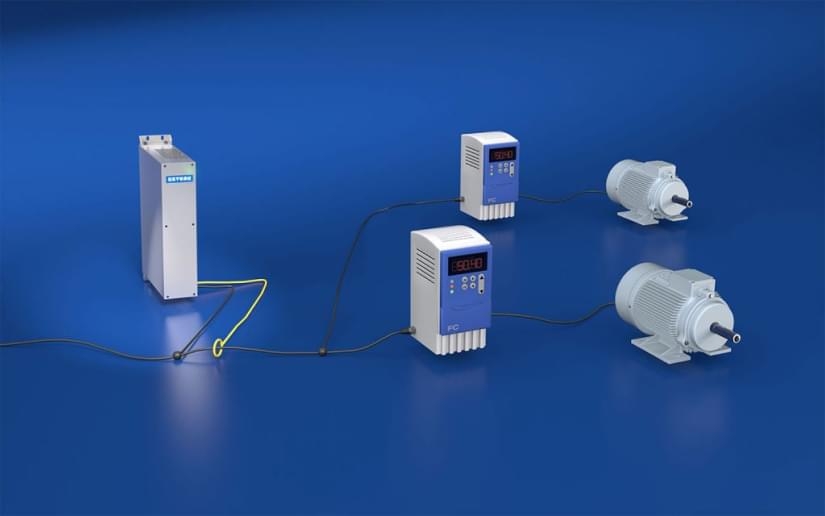Active Harmonic Filters by REVCON
Overview of RHF-Active Harmonic Filters
Our compact and cost-effective active harmonic filters are mainly used in:

Marine

HVAC
Oil & Gas
Water treatment
Data center
General Industry

Power Quality Challenges and Harmonic Distortion Explained
One of the biggest challenges to power quality is harmonic distortion. The next sections explain the negative effects of this phenomenon and the best ways to mitigate this problem.

Why is Harmonic Mitigation Important?
In theory, all electrical sources are assumed to have a pure sinusoidal current waveform. However, the truth is that waveforms vary widely for most equipment in the real world. In fact, non-linear loads are the norm now, good examples being the power supply for a computer or the diode input bridge of a 6-pulse drive.
These non-linear loads distort the main voltage. Total Harmonic Distortion or THD typically evaluates this distortion. Simply put, it is the ratio of the sum of power generated by all harmonic components to the fundamental frequency, also known as the lowest frequency of a periodic waveform. THD is calculated by evaluating frequencies ranging from the 2nd to the 50th harmonic.
Thus, harmonic mitigation is critical in ensuring the proper functioning of equipment and preventing any possible downtime caused by this distortion, a task expertly performed by active harmonic filters.

Negative Effects of Harmonic Distortion
To further emphasize the importance of harmonic mitigation using an active harmonic filter, here are some negative effects of distortion:
- Increase losses in electrical components like transformers, cables, and motors, leading to reduced overall system efficiency.
- The additional heat caused by harmonics can damage sensitive equipment, reduce the lifespan of insulation, and lead to premature failure of transformers and motors.
- Harmonics can cause voltage waveform distortion, leading to poor power quality that affects the operation of equipment reliant on clean, stable power.
- Protective devices like circuit breakers and relays can trip unexpectedly due to harmonic-induced currents.
- Harmonics can interact with system impedance, creating a resonance that amplifies specific harmonic frequencies, potentially causing severe damage to the system.
- Interference with communication networks and sensitive instrumentation.
- Overload of PFC capacitor banks

The Advantages of RHF-Active Harmonic Filters with SiC Technology
The RHF-Active harmonic filters are the successors of the conventional IGBT (Insulated Gate Bipolar Transistors) Technology filters. This new line of filters operates on SiC technology, where SiC stands for Silicon Carbide power modules. Thus, this class of active harmonic filters has numerous advantages over their IGBT counterparts:
Noiseless Operation: The frequency of RHF-Active filters is very high, exceeding 50kHz. This makes it practically noiseless, making it invaluable in an industrial environment.
High Energy Efficiency: With an energy efficiency rating of around 98.5 %, this active harmonic filter can save 75 % or more in energy costs for manufacturers.
Compact Design: The compact design makes it ideal for applications with spatial constraints.
Accuracy: This type of active harmonic filter is highly accurate when compared to its IGBT counterpart in terms of harmonic mitigation, particularly higher-order harmonics.

How RHF-Active Harmonic Filters Work
Injecting Inverse-Polarity Harmonics for Cancellation
The RHF-Active harmonic filters work as a parallel circuit to the main load and it injects harmonics that are directly proportional to the distortion. That is, the injected harmonics are of inverse polarity and exact magnitude to the distortion. This is radically different from a typical harmonic filter that uses a line filter with tuned passive filter circuits.
This technology also allows the active harmonic filter to adjust its input as per the distortions. The end result is the reduction of the THD to an acceptable standard, a key criterion for any electrical system of quality, as defined by IEEE 519-2014.

Key Benefits of Using RHF-Active Harmonic Filters
Dynamic Compensation for Various Loads
Compared to passive harmonic filters that are designed for a specific load and harmonic spectrum, active harmonic filters can effectively neutralize varying harmonic loads. Therefore, whether the load is stable or dynamic, active harmonic filters can compensate for both cases.
Moreover, if there are multiple non-linear loads acting on a circuit, then these filters can be used to compensate for the load in a decentralized manner. Lastly, they can be easily installed at any point in a low-voltage network and even retrofitted as required.
Elimination of Reactive Power Issues
Another issue that can come up with passive filters is the generation of reactive power. This is a form of non-useful power that goes back to the source, negatively impacting energy efficiency. Reactive power is present mainly in the load range of 0-30 percent, making it practically non-viable for systems that operate in this load range. The generation of reactive power is eliminated altogether with active harmonic filters, helping systems achieve a power factor of almost 1, which is considered ideal, irrespective of the load.
Typical Applications of REVCON Active Harmonic Filters
Where to Use RHF-Active Filters?
| Application | Description |
|---|---|
| Frequency Converters | These active harmonic filters can be used directly on frequency converters. |
| Central Harmonic Compensation at Feeders | Extracts fundamental components from harmonics, providing compensation for feeders. |
| Data Centers, Pumps, Compressors, and Ventilation Systems | Require continuous operation and can’t afford downtime, making active harmonic filters essential. |
Retrofitting and New System Installations with RHF-Active
RHF-Active as a Retrofit Solution
Replace passive filters with active harmonic filters for applications where the drive is already installed. This filter can single-handedly mitigate the harmonics of multiple loads.
Use in Newly Designed Systems
Active harmonic filters are versatile and can be added to newly designed systems due to their compact and lightweight nature. It is a perfect solution for new installations.
Compliance with IEEE Standards and Performance Metrics
Meeting IEEE 519-2014 with RHF-Active
All electric systems must meet the IEEE 510-2014 international standards for harmonics. RHF-Active harmonic filters accomplish this by reducing the Total Harmonic Distortion (THD or THDi) to an acceptable range.
Furthermore, active harmonic filters can also handle symmetrical 3-wire loads (3P3W) as well as 4-wire networks with single-phase loads (3P4W), wiring systems used by electric meters. 3P3W is suitable for balanced loads whereas 3P4W is ideal for unbalanced three-phase loads.
Flexible Configurations and Custom Solutions
Available Configurations
| Type | Features |
|---|---|
| Open Chassis | UL Type 1 |
| Panel Solution | Combine harmonic filters up to 1500A in UL Type 1, UL Type 12, and UL Type 3R |
| Active Harmonic Filters | All are lightweight and feature compact sizes for easy integration into any circuit. |
Need a Customized Solution?
For all requirements of tailormade active harmonic filters, contact us at ADM Engineering Inc. Our wide portfolio and extensive experience allow us to offer customized solutions for any application.
Further information on individual sizes are listed in the datasheets. Please select your parameter.
If you can't find your preferred filter above, please don't hesitate to contact us. Due to our wide portfolio and long experience we are able to offer customized solutions for any application.
We are currently working on bringing you the full version of our site. Some of the functionalities may be limited at this time.
If you have any questions about the services we offer don’t hesitate call us at +1 (877) 236-8337.




